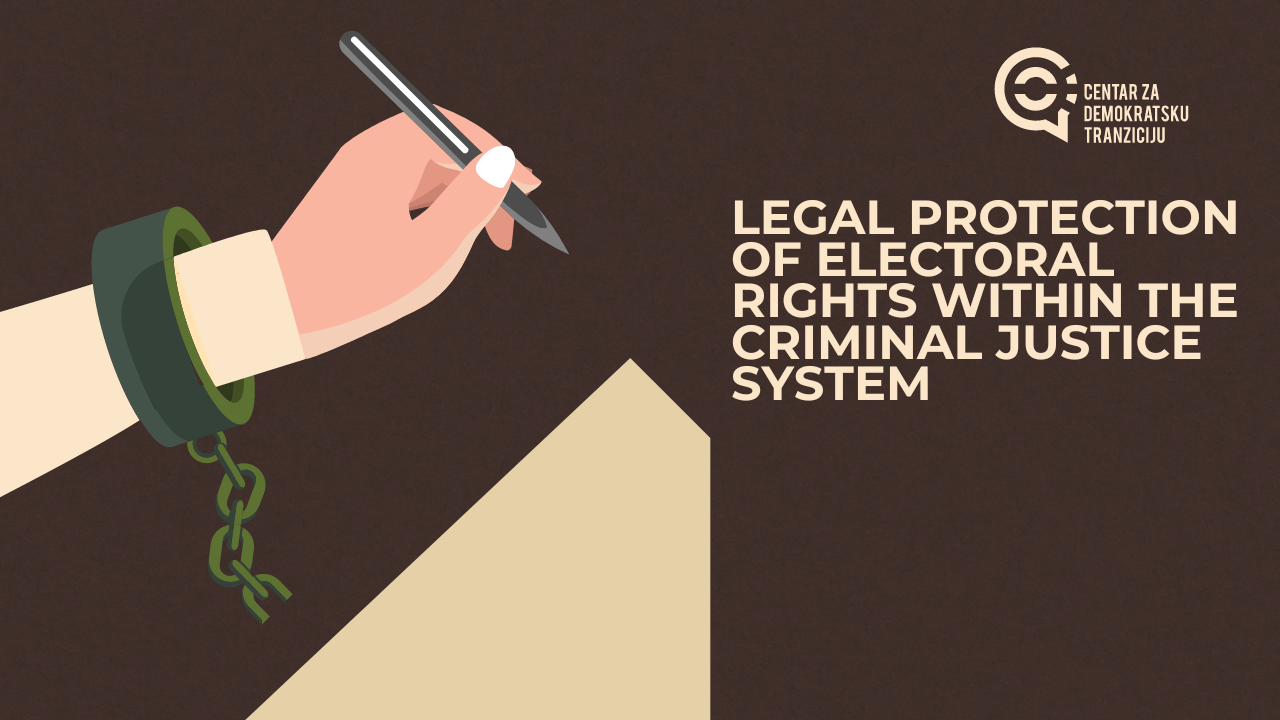Protection of electoral and political rights by means of criminal sanctions is crucial for preserving the integrity of democratic societies. Such legal frameworks serve as the foundation of fair and representative governments, guaranteeing that every individual is considered, and that their choices are respected. By imposing penalties for actions that undermine these rights, such as violating freedom of choice, preventing elections, intimidation, financial abuse and other fraud, societies can prevent such behaviour and protect the democratic process. Criminal sanctions act as a deterrent, signalling the severity of violations of these fundamental rights and reinforcing the principle that free and fair elections are inviolable. Without such protection, the very essence of democracy is threatened, leading to erosion of trust in institutions and deprivation of citizens’ right to vote, which ultimately undermines the foundations of a just and equal society.
Within the current cycle of reform of electoral legislation, the Center for Democratic Transition (CDT) focuses on the concept of electoral justice, as a key component of rule of law in democratic societies. In all electoral processes, electoral irregularities, errors and violations are inevitable, and the prospect of individuals and organisations attempting to undermine the electoral process for their own purposes seems inescapable. For election results to be perceived as legitimate and credible, it is essential to have an effective electoral justice system in place.
We have analysed the issue of protection of electoral rights in two publications. The first publication focused on the election process, and the issues that are most closely related to the exercise of rights in that process; while the current publication covers aspects of criminal law protection of electoral rights.
Relevant public opinion surveys in Montenegro continuously show that a significant number of citizens do not perceive election processes as fair and democratic. Although the latest surveys show certain improvements, according to an OSCE survey from 2024, a high percentage of respondents (69%) still believe that electoral fraud is an issue in the context of elections in Montenegro. According to the latest data from the Montenegrin National Election Study, every other citizen in Montenegro believes that people receive money for voting. Every other citizen believes that people are blackmailed into voting a certain way; one in five believe it happens all the time; while 30 percent think it happens very often.
Perception surveys are focused on the attitudes and beliefs of respondents, indicating that these negative perceptions can be the product of negative social and political circumstances, messages and campaigns, rather than of actual, direct exposure to unlawful activity. However, citizen’s perception was, unquestionably, influenced by a series of scandals related to election processes, exposed by researchers and the media, which did not reach an adequate judicial epilogue that would feed the perception that justice was served.
In the last decade, we have witnessed a number of situations that indicated vote buying, voter pressure, electoral register manipulation and illegal campaign financing. The formula “one employee – four votes” has become an operating model for every government, instead of being subject to rigid sanctions. Five years into the so-called “envelope” affair, a judicial epilogue is nowhere in sight. Judicial statistics obtained for the purpose of this analysis show that in the past ten years, a total of 32 final convictions were handed down for criminal offences against electoral rights, most of which were for violation of the freedom of choice in the casting of ballots, while there were no cases regarding unauthorised use of state assets or abuse of election financing.
When the Committee for Comprehensive Electoral Reform was established, CDT recommended that its mandate be expanded to include discussions on the Criminal Code of Montenegro in relation to criminal offences against electoral rights. New or amended provisions in relation to legislative frameworks that the Committee discusses should be accompanied by effective and deterrent sanctions. Bearing in mind the historic lack of sanctions, or inadequate penalties being imposed for serious violations of electoral rights and rules related to elections, we believe that sanctioning through misdemeanour penalties does not suffice, and that a comprehensive reform of the electoral legislation should also entail amendments to the Criminal Code.
Recommendations for improving the criminal legislation, drawn from analyses of domestic and international legal frameworks, include as follows: transferring the criminal offence from Article 115 of the Law on Election of Councillors and Members of Parliament to the Criminal Code to ensure consolidation of the criminal legislative framework in relation to electoral rights; tightening the penal policy by eliminating the possibility of imposing fines for criminal offences against electoral rights; introducing liability for attempted crimes against electoral rights; consider suspending passive voting rights for persons convicted of offences against electoral rights; consider introducing new criminal offences such as giving and receiving bribes in connection with voting, and bribing MPs or councillors; criminalising the act of counterfeiting voter signatures, and providing contributions from prohibited sources. These changes are aimed at improving criminal law protection of electoral rights, strengthening accountability, and deterring electoral theft and fraud.
This publication was created under the framework of the project “Electoral Reform in Focus: It’s Time!”, which the Center for Democratic Transition (CDT) is implementing in cooperation with the Association for Responsible and Sustainable Development (UZOR) and the Association of Youth with Disabilities (UMHCG), with the support of the European Union, through the EU Delegation in Montenegro. Its content is the sole responsibility of CDT and does not necessarily reflect the views of the European Union.
We are open to public dialogue related to the content of this publications and to all well-intended suggestion and criticism.
The publication is available here.



